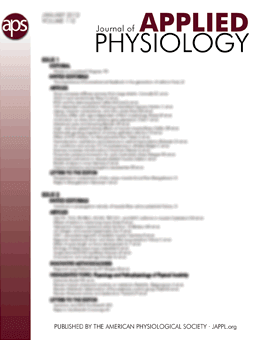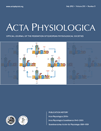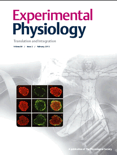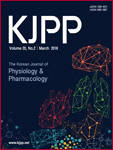
American Journal of Physiology-Regulatory, Integrative and Comparative Physiology
metrics 2024
Integrating Research for a Deeper Understanding of Life
Introduction
The American Journal of Physiology-Regulatory, Integrative and Comparative Physiology, published by the American Physiological Society, serves as a premier platform for disseminating cutting-edge research in the fields of physiology, emphasizing regulatory, integrative, and comparative studies that advance our understanding of bodily functions. With an ISSN of 0363-6119 and E-ISSN of 1522-1490, this esteemed journal is recognized for its substantial impact, maintaining a 2023 Q2 ranking in both the physiology and medical physiology categories as well as commendable positions in Scopus rankings. The journal has been pivotal since its inception in 1977 and continues to foster interdisciplinary dialogue among researchers, professionals, and students alike, contributing significantly to the evolving landscape of physiological sciences. Although it operates under a traditional subscription model, its commitment to high-quality, peer-reviewed content ensures that it remains an essential resource for anyone engaged in physiological research and education.
Metrics 2024
 0.90
0.90 2.20
2.20 2.80
2.80 194
194Metrics History
Rank 2024
Scopus
IF (Web Of Science)
JCI (Web Of Science)
Quartile History
Similar Journals

Physiological Genomics
Decoding the Genetic Blueprint of Physiological ProcessesPhysiological Genomics is a prestigious scholarly journal published by the American Physiological Society, dedicated to advancing the understanding of the genetic underpinnings in physiology. With an ISSN of 1094-8341 and an E-ISSN of 1531-2267, this journal serves as a vital platform for researchers exploring the intersection of genetics and physiological processes. As of 2023, it enjoys a respectable impact factor, particularly standing strong in the Q2 quartile in both Genetics and Physiology categories, illustrating its importance within a competitive landscape. With an impressive rank of #69 out of 193 in Biochemistry, Genetics, and Molecular Biology - Physiology, and #128 out of 347 in Genetics, it reflects a robust commitment to quality research. Committed to fostering innovation, Physiological Genomics provides comprehensive access to groundbreaking studies from 1999 to 2024 and remains a quintessential resource for researchers, professionals, and students alike aiming to enhance their understanding of physiological genomics.

Journal of Physiological Sciences
Bridging Basic and Applied Physiological ResearchThe Journal of Physiological Sciences, published by BMC, stands as a prominent platform for the advancement of research in the field of physiology. Based in Japan, this open-access journal (ISSN: 1880-6546, E-ISSN: 1880-6562) is committed to disseminating high-quality scientific articles that explore various facets of physiological functions and mechanisms. With a 2023 Scopus ranking placing it within the 41st percentile in the category of Physiology, it is recognized for contributing significant insights that bridge basic and applied physiological research. The journal maintains a Q2 quartile ranking within its category, highlighting its impact within the scientific community. Researchers, professionals, and students are encouraged to engage with cutting-edge studies published from 2006 to 2024, fostering an environment of knowledge accessibility and scientific collaboration. The journal not only serves as a vital resource for those involved in physiological research but also promotes broader understanding and application of physiological principles across various health and science sectors.

GENERAL AND COMPARATIVE ENDOCRINOLOGY
Advancing understanding of endocrine systems across species.GENERAL AND COMPARATIVE ENDOCRINOLOGY, published by Academic Press Inc Elsevier Science, is a distinguished journal that has been at the forefront of endocrine research since its inception in 1961. With an ISSN of 0016-6480 and an E-ISSN of 1095-6840, this journal caters to a diverse audience, including researchers, professionals, and students in the fields of animal science, zoology, and endocrinology. It holds a prestigious Q1 ranking in Animal Science and Zoology and is recognized in the Q3 quartile for Endocrinology, indicating its significant contribution to advancing scientific knowledge. The journal is also well-regarded within the Scopus rankings, with impressive placements in multiple categories, highlighting its impact and relevance in the academic community. By focusing on comparative analyses and fostering a deeper understanding of hormone function and regulation across species, GENERAL AND COMPARATIVE ENDOCRINOLOGY aims to bridge gaps in knowledge and stimulate innovative research paradigms. While it does not currently offer Open Access, the journal remains committed to high-quality peer-reviewed content, making it an essential resource for anyone engaged in this vital field of study.

Journal of Applied Physiology
Unveiling the Complexities of Human Physiology.The Journal of Applied Physiology, established in 1948 and published by the American Physiological Society, stands as a cornerstone in the field of physiology and applied health sciences. With an impact factor reflecting its rigorous scholarly contributions, this peer-reviewed journal ranks in the Q1 category for both Medicine (miscellaneous) and Physiology as of 2023, further emphasizing its prestige and relevance. Researchers and practitioners are drawn to its comprehensive scope, which includes physiological and biomechanical responses relevant to health, exercise, and clinical practices, making it an essential resource for advancements in sports science and medical physiology. Though it does not offer Open Access, the journal provides a wealth of high-quality research, with contributions that are crucial for understanding the complexities of human physiology. Its inclusion in Scopus ranks demonstrates a solid commitment to advancing knowledge in the field, appealing to a diverse audience of researchers, professionals, and students committed to exploring the intricate interactions between physiological processes and applied health.

Journal of Experimental Zoology Part A-Ecological and Integrative Physiology
Transforming our understanding of environmental interactions.The Journal of Experimental Zoology Part A - Ecological and Integrative Physiology, published by WILEY, is a distinguished peer-reviewed journal focusing on ecological and evolutionary physiology, providing a robust platform for research that bridges both ecological and integrative physiological concepts. With an impressive impact factor and recognition as a Q1 journal in both Animal Science and Zoology and Ecology, Evolution, Behavior and Systematics in 2023, it positions itself as a leader in advancing our understanding of organismal biology and environmental interactions. The journal is committed to open access, offering researchers and professionals worldwide the opportunity to share and disseminate their findings freely. Since its inception in 2017, it has rapidly gained prominence—ranking within the top percentiles of Scopus Ranks across several disciplines, including genetics and molecular biology. This not only underscores its relevance but also highlights its vital role in facilitating interdisciplinary approaches essential for addressing contemporary biological challenges. Researchers, educators, and students alike will find in this journal a valuable resource for cutting-edge studies and innovative methodologies in the field.

Physiological Reports
Elevating the Standards of Physiological InquiryPhysiological Reports is a pioneering open-access journal published by WILEY, dedicated to advancing the field of physiology through the dissemination of high-quality research. Since its inception in 2013, this journal has provided a platform for innovative studies in both general physiology and medical physiology, making significant contributions to our understanding of biological processes. With an impact factor that reflects its growing influence—as evidenced by its placement in the Q2 category for physiology and medical physiology in 2023—Physiological Reports is positioned as a vital resource for researchers and practitioners alike. The journal encourages the submission of diverse studies ranging from cellular mechanisms to systemic physiology, presenting a unique opportunity for authors to reach a global audience without access barriers. It has established a reputation for rigorous peer review and timely publication, ensuring that cutting-edge research is readily available to stimulate further inquiry and collaboration in the scientific community.

Acta Physiologica
Connecting Researchers through Open Access KnowledgeActa Physiologica is a premier, peer-reviewed journal published by WILEY, dedicated to the dissemination of high-quality research across the field of physiology. With an impressive impact factor reflective of its Q1 category ranking in Physiology for 2023, this journal is a vital resource for researchers, professionals, and students alike, seeking to explore the complexities of biological systems. The journal is indexed with a commendable Scopus rank of #18 out of 193 in its category, placing it within the top 10% of its field, which underscores its influence and citation frequency within the academic community. Acta Physiologica publishes a variety of articles that address fundamental physiological concepts, innovative methodologies, and cross-disciplinary research. With its open access options, the journal ensures that cutting-edge knowledge is readily accessible, fostering an environment of collaboration and advancement in the study of physiology. Spanning from 2006 to 2024, the journal continues to be at the forefront of physiological research and education, encouraging the global sharing of knowledge through its comprehensive content.

PFLUGERS ARCHIV-EUROPEAN JOURNAL OF PHYSIOLOGY
Pioneering Discoveries in European PhysiologyPflügers Archiv - European Journal of Physiology, published by Springer Heidelberg, stands at the forefront of physiological research, showcasing groundbreaking studies since its inception in the 1950s. With a distinguished ISSN of 0031-6768 and an E-ISSN of 1432-2013, this esteemed journal maintains a robust reputation, holding Q1 rankings in Clinical Biochemistry, Physiology, and Medical Physiology as of 2023. Its impressive Scopus rankings place it in the top percentile across various categories, including Biochemistry, Genetics and Molecular Biology and Medicine. Pflügers Archiv serves as a vital platform for researchers, professionals, and students, facilitating the dissemination and discussion of advanced physiological concepts and methodologies. Although it does not currently offer open access, its rigorous peer-review process ensures the highest quality publications that contribute significantly to our understanding of physiological science. Explore the depth of physiological research that shapes our academic landscape today.

EXPERIMENTAL PHYSIOLOGY
Shaping the future of Nutrition and Physiology research.EXPERIMENTAL PHYSIOLOGY, published by WILEY, stands as a vital resource in the fields of Nutrition and Dietetics and Physiology, providing high-quality, peer-reviewed research since its inception in 1990. With an impressive categorization into the Q2 quartile in these domains, the journal emphasizes the integration of experimental and clinical findings, making significant contributions to our understanding of physiological processes and nutritional impacts on health. The journal operates within a competitive landscape, ranked significantly in Scopus, showcasing its relevance to both the medical community and nutritional sciences, as evidenced by its rankings in Nursing, Medicine, and Biochemistry. Though it is not currently open access, the journal remains an indispensable tool for researchers, professionals, and students seeking to deepen their knowledge and stay updated on cutting-edge research. With a publication window extending to 2024, EXPERIMENTAL PHYSIOLOGY continues to influence the academic discourse and promote advancements in its respective fields.

KOREAN JOURNAL OF PHYSIOLOGY & PHARMACOLOGY
Connecting researchers and professionals in the heart of pharmacology.Welcome to the Korean Journal of Physiology & Pharmacology, a pivotal academic platform dedicated to advancing the disciplines of physiology and pharmacology. Published by the esteemed Korean Journal of Physiology & Pharmacology, this journal has been disseminating valuable research findings since its inception in 1997 and continues to be a critical resource for researchers, professionals, and students in South Korea and beyond. With an ISSN of 1226-4512 and E-ISSN of 2093-3827, it offers insights into various aspects of drug action and physiological mechanisms. Although this journal currently does not subscribe to Open Access, it plays a vital role in bridging the gap between experimental and clinical studies, receiving commendations for its quality. In the 2023 Scopus rankings, it is notably positioned in the Q3 quartile for Pharmacology and Q4 for Physiology, reflecting its commitment to excellence. As the journal converges towards its comprehensive coverage in 2024, it remains a cornerstone for those looking to engage deeply with critical developments in these fields.